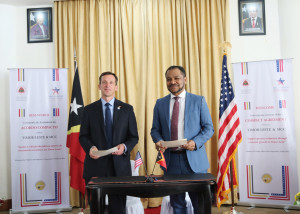The National Parliament, at the proposal of the Government and through Resolution no. 42/2022 of October 19th, ratified today the compact Millennium Challenge agreement, with a global amount of 484 million American dollars, for a five-year program to the improvement of two very important areas for the development of Timor-Leste, education and sanitation and water supply.
The cooperation pact was signed on 19 July between Minister Fidelis Magalhães, representing the Government of Timor-Leste and the Vice-President of the American government agency Millennium Challenge Corporation (MCC), Cameron Alford. 
The water, sanitation and drainage component aims to reduce the contamination of drinking water and groundwater, which can cause diseases and impede the well-being and health of children and adults. The project includes the construction of a factory to produce chemical disinfectants for the city’s water supply, construction of the country’s first central wastewater system, improvement of the drainage network for the capital Dili and four neighbouring municipalities, policy and institutional reforms as well as social and behavioural changes to improve the sanitation system and water management at the household level.
The water, sanitation and drainage project, besides its direct impact on the health of our citizens, will also contribute to reducing the risk of flooding, which has affected our country so much in recent years, avoiding its environmental and socio-economic impacts by ensuring sustainable management of water and sanitation.
The education component aims to improve the quality of high school education for students by improving high school education and school leadership across the country. The project will establish the country’s first formal initial teacher training certification institution, the Centre of Excellence, which will offer professional training and certification for future and current high school teachers and leaders. Investing in teacher training will lead to better high schools, with students who will be better prepared for jobs or a post-high school education, and thus improve their ability to contribute to the economic growth of the country.
Following the ratification of this agreement, the next step will be to set up the institutional conditions for the management, implementation and development of the programmes to be implemented in these two areas and to fulfil the necessary criteria to receive the said MCC funds.
It is, therefore, appropriate to constitute a public legal entity, with administrative, patrimonial and financial autonomy, with the necessary attributions and competencies to ensure the coordination and monitoring of the implementation of the projects financed by the MCC, as defined in the Compact Agreements signed between both States.
The constitution of a public legal entity with specific responsibilities for coordinating and monitoring the implementation of the Compact Agreements will allow a better allocation of resources for the achievement of their goals and more effective supervision and execution of the financial plan that must necessarily be approved, namely due to simpler and faster procedures for the approval of expenditure and public procurement.